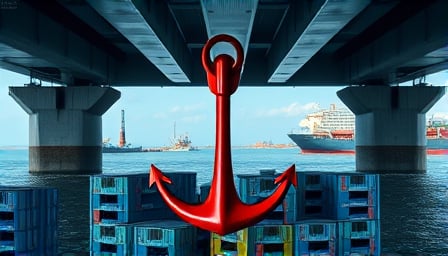PTL Ltd: A Tumultuous Journey in the Energy Sector
In the volatile world of energy, PTL Ltd stands as a stark reminder of the sector’s unpredictability. Once a beacon of potential in marine fuel logistics, the company now finds itself grappling with a precarious financial situation. With a market capitalization of just $11.62 million and a share price that plummeted to a dismal $0.257 on June 10, 2025, PTL Ltd’s trajectory raises critical questions about its future viability.
A Fall from Grace
PTL Ltd’s journey from a 52-week high of $15.78 on January 13, 2025, to a low of $0.221 just days ago, paints a grim picture. This dramatic decline is not just a number; it’s a reflection of deeper issues within the company. The negative price-to-earnings ratio of -0.718474 underscores the financial distress PTL Ltd is experiencing. Investors are left wondering: what went wrong?
The Core of the Crisis
At its core, PTL Ltd is a holding company specializing in marine fuel logistics services. Its primary offerings include vessel refueling for container ships, bulk carriers, general cargo vessels, and chemical tankers. The company prides itself on providing a one-stop solution for vessel refueling, covering everything from fuel supply at various ports in the Asia Pacific region to arranging refueling activities and offering trade credit.
However, despite these comprehensive services, PTL Ltd has struggled to maintain financial stability. The company’s engagement in handling disputes related to fuel products and providing contingency solutions has not been enough to offset its financial woes. The question remains: why has a company with such a seemingly robust service offering failed to deliver on its financial promises?
A Critical Examination
Several factors could be contributing to PTL Ltd’s downfall. The energy sector is notoriously volatile, and the company’s reliance on marine fuel logistics makes it particularly susceptible to fluctuations in global oil prices and geopolitical tensions. Additionally, the competitive landscape in the Asia Pacific region is fierce, with numerous players vying for dominance in the marine fuel logistics market.
Moreover, PTL Ltd’s financial metrics suggest a company struggling to generate profits. The negative price-to-earnings ratio indicates that the company is not only failing to turn a profit but is also losing money. This raises concerns about its operational efficiency and strategic direction.
Looking Ahead
As PTL Ltd navigates these turbulent waters, the company must address its financial instability and reassess its strategic approach. Investors and stakeholders are watching closely, and the company’s ability to adapt and innovate will be crucial in determining its future.
In conclusion, PTL Ltd’s current predicament serves as a cautionary tale for companies in the energy sector. It highlights the importance of financial prudence, strategic foresight, and adaptability in an industry fraught with challenges. Only time will tell if PTL Ltd can steer itself back to calmer seas or if it will continue to drift in the storm.
